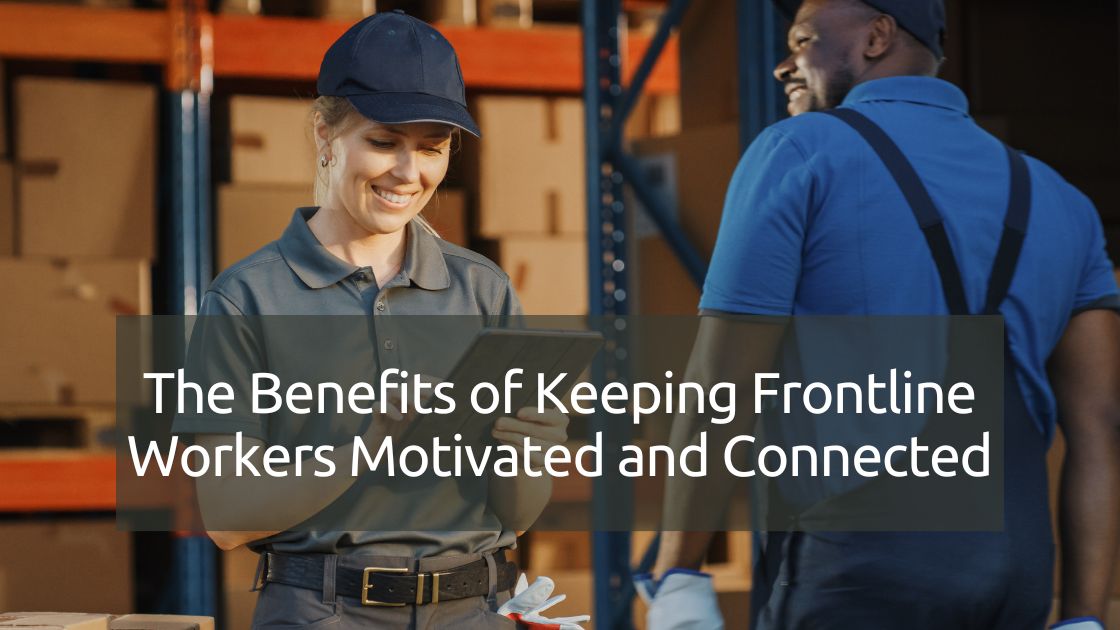Companies in today’s competitive market often employ a wide range of people, including those who sit at desks, those who work from home, and those who do a combination of the two. Despite this variety, frontline employees are frequently overlooked. About 70% of the American workforce is made up of professionals who do not have access to a private office. These individuals are essential in many fields, from the factory floor to the hotel business. Their significance, however, is often lost in the shuffle, and their rights to safety and autonomy are neglected as a result.
In today’s competitive market, it is crucial for business owners and managers to provide their teams with the resources they need to succeed. This post will explore why it’s so important to ensure frontline employees’ safety and connectivity, as well as how organizations may lay the groundwork for their success.
Frontline Work: The Crucial Intersection of Safety and Communication
Workers in a conventional workplace have ready access to a variety of means of communication and a quantity of information. However, this ease of communication and teamwork isn’t always available to those on the front lines. Frontline employees in sectors like manufacturing, logistics, and others just cannot spend their days chained to a desk. Instead, they need portable tools and ubiquitous communication systems.
One glaring problem is brought to light by Microsoft’s “Firstline Worker” playbook. Seventy-three percent of frontline workers frequently have to pause what they’re doing to seek for information, and eighty-five percent say they don’t get enough information to complete their jobs. More than half of the workforce feels unheard due to the absence of appropriate communication tools, which not only reduces productivity but also increases dangers for those working in dangerous areas.
Engineers taking readings in hazardous locations, night nurses, security guards, and guards are all examples of frontline professionals that frequently work alone. Providing a wide range of standard safety measures is essential for giving these employees peace of mind while they work. According to Paul Rowe, Spectralink’s Senior Product Manager, the company’s newest phones, such as the S Series, prioritize safety by including features like red alert buttons, alarm icons, pull-cords, and automated motion recognition.
In times of crisis, teams may struggle to summon aid without basic amenities like duress buttons, GPS services, and stable phone connections.
The Benefits of Empowering and Protecting Employees
When frontline employees’ needs for safety and communication are ignored, it can lead to a number of problems, including decreased customer satisfaction and increased turnover. Instead, many benefits become available to firms when they provide their staff with high-quality, dependable technology.
- Enhanced Productivity: When workers feel safe and connected to the company, they are more inclined to take pride in their work. They won’t need to waste time gathering data and will be able to respond to emergencies more rapidly. In fact, studies have shown that use of mobility solutions increases output by 34 percent.
- Improved Customer Satisfaction: When workers are able to work together efficiently, they are better able to address consumer concerns and keep them satisfied. Microsoft claims that businesses who implement mobility solutions see an 83% increase in customer satisfaction.
- Heightened Employee Engagement: Workers who feel secure and well-connected are less inclined to quit their employment. In fact, 82% of businesses report improved levels of staff satisfaction and 64% see lower turnover rates after using the correct communication solutions for frontline personnel. When workers are content, they put in greater effort and see greater results.
Unlocking the Potential of Frontline Workers with CloudApper AI TimeClock
How therefore can firms guarantee the continued enthusiasm, connectivity, and security of their frontline staff? CloudApper AI TimeClock and similar state-of-the-art technologies are the answer. This AI-driven tablet based time clock software is revolutionary because it caters to the specific requirements of frontline employees and improves their working environment as a whole.
Here are some ways in which CloudApper AI TimeClock might be useful:
Seamless Integration: With CloudApper AI TimeClock’s ability to interact with popular HR and payroll platforms, you can be certain that your frontline employees will always have access to the information they need.
Enhanced Communication: Frontline employees who are unable to stay in one place all day will appreciate the mobility and ease of communication made possible by CloudApper AI TimeClock.
Safety Features: CloudApper AI TimeClock doesn’t just track time; it offers a comprehensive set of safety features that are invaluable for frontlineworkers. From AI assitant to self services and voice conversations, this solution empowers your frontline employees to work with peace of mind.
Empowerment and Efficiency: CloudApper AI TimeClock equips your staff with the resources they need, allowing them to spend less time seeking for HR related answers and more time actually doing their work.
Employee Engagement: Employee satisfaction is increased using CloudApper AI TimeClock, leading to less attrition and increased staff engagement, which in turn leads to increased productivity and morale.
Finally, frontline employees play a crucial part in the success of firms in a wide range of industries. The results of ignoring their requests for protection and information might be disastrous. The CloudApper AI TimeClock provides a comprehensive answer to these problems, guaranteeing improved output, contented clients, and enthusiastic workers. Businesses who invest in such state-of-the-art tools will find that their frontline employees become safer, more connected, and more motivated.

One thought on “The Benefits of Keeping Frontline Workers Motivated and Connected”